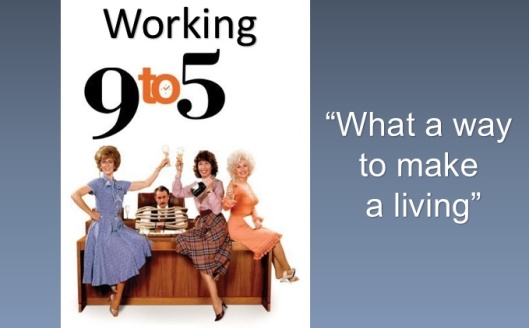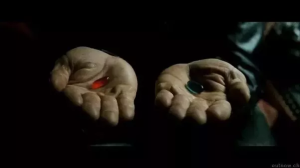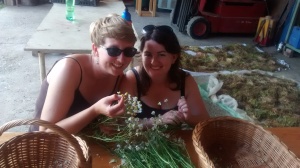
Fabulous film, well worth a watch!
I’ve already written about my brave plunge becoming the travelling privileged, and how this helped me to rethink what I think of as my value. But what does all this mean for my future? Would it be totally irresponsible to not have a regular income, savings and a plan……?
80% of people are unhappy in their jobs
Forbes
I didn’t know I was one of them.
So I was stressed, tired, felt under appreciated, but all that is normal right?
I mean, it wasn’t all doom and gloom. I’ve always liked the people I’ve worked with; I’ve mostly felt like I was at least making some positive contribution, and I do love new challenges.
Me and Lucy had thought we were conscious, we believed we were choosing to work 9-5 Mon- Fri now, to save up so we could both work part time in the future. Somehow, I knew working part-time was a good goal, even if I could not recognise I was unhappy in my job.
The truth is, I was aware of the idea you didn’t have to earn your living working 9-5, but I wasn’t ready, didn’t have the head space to really engage with it, and believed that even if others could do it, it wasn’t really an option for me.
But then.. I quit my job, I did have space, and I have engaged, with a lot!
The movement redefining work
Whilst doing a workaway in Airlie Beach, cleaning cabins for a maximum of 3 hours a day, 5 days a week (we never did 15 hours a week!- luck again!) for six weeks; I took a hot, sticky, uphill cycle to a library to print my Parkrun barcode (How could I have forgotten such an important document?) There was a pile of old books, which I thumbed through and one called out to me, ‘I Could Do Anything, If Only I knew What It Was’ by Barbara Sher.
Sher believes what we are good at, doesn’t necessarily have anything to do with what we should be doing. The book has exercises to help people break through ideas they have absorbed from society, early childhood and family expectations about the work they should be doing. I think she is brave to have attempted to fit all this in a book, rather than just suggesting everyone has long term therapy… but she pulls it off well. Many of the exercises have helped me to explore, what I enjoy and get energy from, and what I do not want to do for work.

From Airlie beach, we travelled to another workaway near Cairns, and met an ex-monk (yes that inspiring guy again!). He shared with us, Live Your Legend, a programme encouraging people to “find the work they can’t not do”. He also gently suggested we start a blog. It’s been 3 months since we met him, but that ex-monk sowed the seeds for lessonslearntontheroad.com in many ways. He also gave us, possibly the best piece of advice anyone has given me: “Anything that you can organise better than someone else is of value“, he gave Subway sandwiches as an excellent example of this!

Beautiful creature, climbing a tree in Cairns
In fact, Workaway has also enabled us to meet people earning their living by doing things they’re passionate about (such as organic farms, retreats, outdoor gear shops, cooking schools)

Perhaps it was the universe conspiring, perhaps it was what I was choosing to engage with, or perhaps just Facebook tailored-advertising(!), but all of this helped me to notice a movement:

It seems more people are wanting do make an income doing something they enjoy. Life Coaching has become a big thing, with people wanting to find their passions, and the number of new businesses in the UK reached a record high in 2015.
However my book telling me I ‘can do anything I want to do’ was written over twenty years ago! She predicts, there will be a change in the work force, which will result in more people becoming experts and consultants in a specialist field, and that freelance work will become the norm. So these ideas – of doing what we love and making a profit from it – have been round for some time.
So… what happened to this ‘we can do anything we want’ movement? I remember at school feeling like we were the generation who had missed the IT boom, we weren’t going to be so lucky. We were also going to have to pay tuition fees if we wanted a university education and who knows what kind of pensions we will receive? Perhaps it was the recession hitting that made me feel that a 1 year contract at a job I wanted, wasn’t good enough; the goal was a full time permanent job, the scarcity made one even more desirable!
But maybe we don’t have to give up 9-5….
I want to acknowledge I know people who are very happy in their work. A good friend is a teacher, who after some time out rediscovered she loves teaching, and it’s totally what she wants to do with her life.
I also know people who have strong boundaries around paid employment. Their time at work is okay, they leave work at work, and have time and energy left for their real passions; choirs, rowing clubs, am dram, allotments, cycling, working a 9 day fortnight and travelling every other weekend!
When I was a sensible professional I remember a more senior colleague saying to me she used to love to cook, but doesn’t have the time or energy anymore. I should have heard this for the warning sign it was, instead I left this job for what I saw as a promotion, managing a team just as unhappy and undergoing as much change as the previous workplace.
About halfway through my travels, this ex-colleague got in touch to tell me she has a horse! You don’t have to quit your job and go travelling. Her horse has completely changed her life, she has to have a boundary on work, because her horse, the thing she loves, is depending on her. Her horse is her real ‘work’.
There are also some positive movements happening within work places, such as social enterprises, where employees are stakeholders and are more likely to have their individual value appreciated. Brene Brown is encouraging workplaces to ‘dare greatly’ and become more humane; by becoming workplaces that shine light on shame, rise to challenging conversations, are innovative and value individual’s contributions. If you are a manager, a teacher, a parent or any kind of leader I strongly recommend you give her book a read ‘Daring Greatly’ (we were already reading it, but the ex-monk also recommended Brene Brown to us!)
There are other conversations about work and value going on today, for example Finland has begun trials for a universal basic income, as a solution to fewer jobs and automation. But with all this noise about different ways to make money – and people even making money by promoting ways to make money – how do we know what to listen to?
And what does all of this mean for me? If my year out of work has taught me nothing else, it’s that I have the same options as anyone else. So if other people can make money doing what they love, so can I. But do I want to? and what do I love doing anyway? and how much money do I want anyway?

Helping Lucy collate thousands of catalogues for delivery in Australia, getting her the sum total of.. 10 quid!
Can I make money from my real work? and is it my real work if I make money from it? Do I want to have my cake and eat it too?
Do I want to just make money doing what I can when I need to, like I did in Australia for two weeks?
Something in this tells me, we all have our paths. It’s useful to engage with other people’s stories, but these belong to other people. We are on our paths, and need to listen out to what is right for us.
I’ve always done jobs that are a bit jack of all trades, I like to learn new things and love engaging with as many ideas as I can. I’m OK that I may not have one thing I “cannot not do” but I’m also OK that I may, and if so I am already on my journey to finding it. But I do know I want to have time and energy to be creative. It may not always be ‘good’ but writing, drawing and making things, feel more like ‘my soul’s work’ than a salaried job, I was good at, ever did.

Anyone who knows me, can now expect a hand made gift.
So for now I am going to redefine what I mean by work. There will be time, when I have to exchange, energy and time (amongst other things) for money or other things that meet my needs. But this is not my work, my work is when I feel inspired, creative and amongst all else free.
I’m stepping out of the norm, watching the ‘movement’ and exploring where I fit in, keeping in check what I’m happy to exchange for what value and what makes my soul happy. My lesson from this road, is that the most responsible thing I can do is do what I can to be happy. It’s one I may have to keep relearning, but it’s a lesson I am committed to!
Everyone has his or her own unique power. It is our responsibility to find that power and use it to the fullest capacity we can in the service of other people.
Toan Lam
What not working taught me about ‘work’ Part D: Conclusion by Poetry is ready to read now!














































 Even Facebook wants to know what job I do!
Even Facebook wants to know what job I do!











